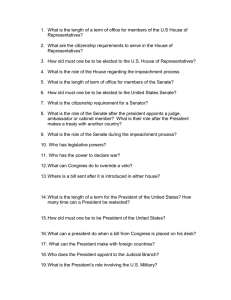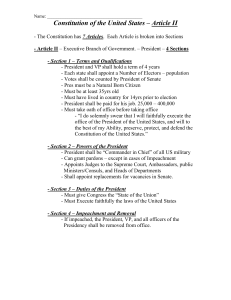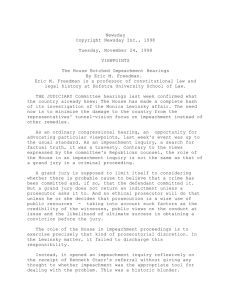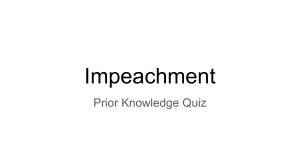Newsday Copyright Newsday Inc., 1999 Friday, January 29, 1999 VIEWPOINTS
advertisement
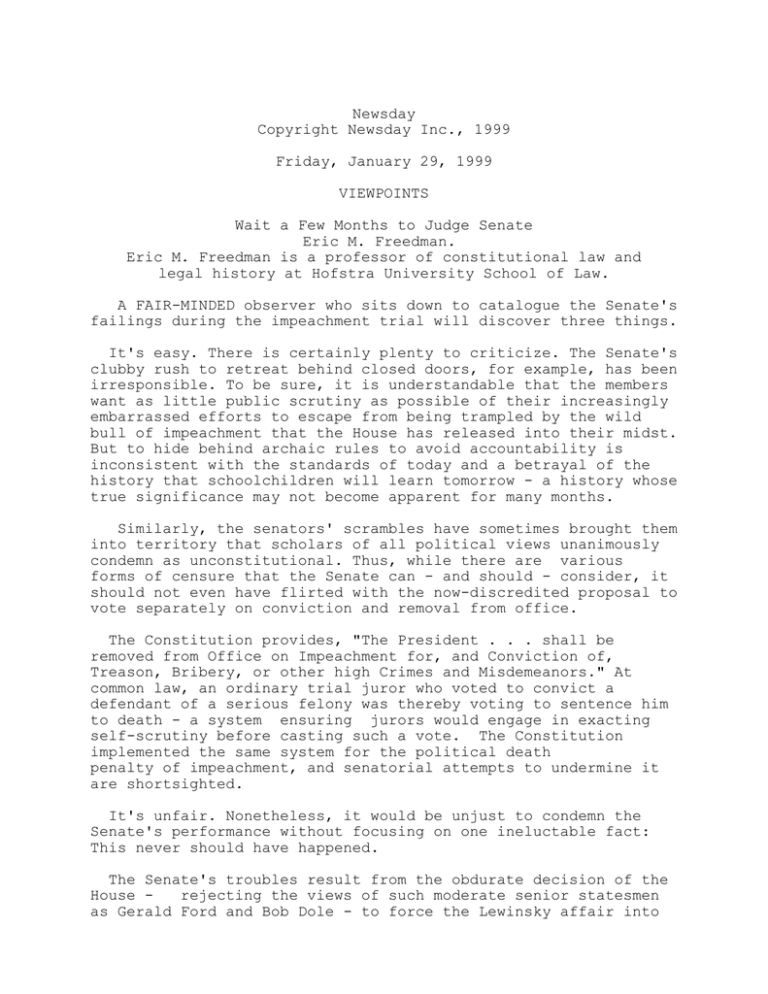
Newsday Copyright Newsday Inc., 1999 Friday, January 29, 1999 VIEWPOINTS Wait a Few Months to Judge Senate Eric M. Freedman. Eric M. Freedman is a professor of constitutional law and legal history at Hofstra University School of Law. A FAIR-MINDED observer who sits down to catalogue the Senate's failings during the impeachment trial will discover three things. It's easy. There is certainly plenty to criticize. The Senate's clubby rush to retreat behind closed doors, for example, has been irresponsible. To be sure, it is understandable that the members want as little public scrutiny as possible of their increasingly embarrassed efforts to escape from being trampled by the wild bull of impeachment that the House has released into their midst. But to hide behind archaic rules to avoid accountability is inconsistent with the standards of today and a betrayal of the history that schoolchildren will learn tomorrow - a history whose true significance may not become apparent for many months. Similarly, the senators' scrambles have sometimes brought them into territory that scholars of all political views unanimously condemn as unconstitutional. Thus, while there are various forms of censure that the Senate can - and should - consider, it should not even have flirted with the now-discredited proposal to vote separately on conviction and removal from office. The Constitution provides, "The President . . . shall be removed from Office on Impeachment for, and Conviction of, Treason, Bribery, or other high Crimes and Misdemeanors." At common law, an ordinary trial juror who voted to convict a defendant of a serious felony was thereby voting to sentence him to death - a system ensuring jurors would engage in exacting self-scrutiny before casting such a vote. The Constitution implemented the same system for the political death penalty of impeachment, and senatorial attempts to undermine it are shortsighted. It's unfair. Nonetheless, it would be unjust to condemn the Senate's performance without focusing on one ineluctable fact: This never should have happened. The Senate's troubles result from the obdurate decision of the House rejecting the views of such moderate senior statesmen as Gerald Ford and Bob Dole - to force the Lewinsky affair into the ill-fitting mold of an impeachment inquiry. In casting aside other available and appropriate tools to investigate and condemn the scandal, the House also discarded the lessons of its own history. Never before had it impeached an official, much less a president, unless it was quite certain, based upon a strong public consensus in favor of removal from office, that there would be a conviction in the Senate. The Senate's current plight, which vividly demonstrates how unwise the House was to upset its established practice, represents the continuing consequence of a misguided attempt to drive a square peg into a round hole. It's irrelevant. Impeachment is not a routine part of our political life. Misconduct by high government officials is. It is a hazardous diversion from the genuine risks we will face in the future to focus on the details of the impeachment process, rather than on the workaday mechanisms intended to secure the amenability of public officers to the law. Specifically, conventional wisdom has it that - sheltering themselves behind the impeachment imbroglio - the incumbent lawmakers will unite to kill off the independent counsel statute when it comes up for renewal in June. Unless concerned citizens of all persuasions join to render this prophecy false, Congress will again be ignoring the lessons of history - this time in a context posing a true continuing threat that dangerous abuses of power will go unremedied. As the country recognized after Watergate, President Richard Nixon's departure from office did not prove that "the system worked." We just got lucky. The independent counsel statute was designed to ensure that we would not have to rely on luck in the future. It created a politcally independent mechanism so that legal accountability for a president who, for example, used his control over lawenforcement agencies to subvert their investigation into his operatives' bugging of the headquarters of the opposition party, would not depend on the vagaries of party control of the Congress or how the public felt about the economy. As the Association of the Bar of the City of New York documented in a comprehensive report last August, the statute has largely served these goals over the past 20 years. Where time has revealed the need for minor fixes, they have been made in an incremental way, just as they could be again next spring. Indeed, whatever one might think about the performance of Kenneth Starr, the true need is for the statute to be strengthened, not weakened. During the criminal prosecutions arising out of the Iran-Contra affair, for example, Lawrence Walsh was forced to drop key charges because executive branch officials, many of them political intimates of the defendants, were in a position to block the release of classified information. This, rather than idiosyncratic scandals of the Lewinsky variety, is the sort of tyrannical official misconduct that we need enduring legal mechanisms to control. The Senate, therefore, should not be judged on the degree of elegance with which it manages to extract itself from the current quagmire. Rather, the standard should be how well it succeeds in the months ahead in coming together with the House to protect all of us over the long term from what Patrick Henry called "the predominant thirst of dominion which has invariably and uniformly prompted rulers to abuse their powers." *END*END*END*END*END*END*END*END*END*END*END*END*END*END*END*END* END*END*END* 1858599 - HUYCK,MELISSA Date and Time Printing Started:04/04/200002:12:58 pm (Central) Date and Time Printing Ended:04/04/200002:12:58 pm (Central) Offline Transmission Time:00:00:00 Number of Requests in Group: Number of Lines Charged: 1 133 *END*END*END*END*END*END*END*END*END*END*END*END*END*END*END*END* END*END*END*
